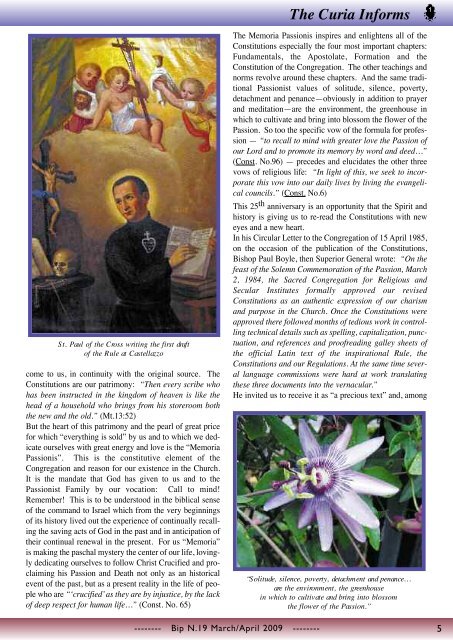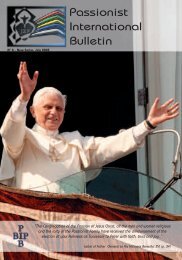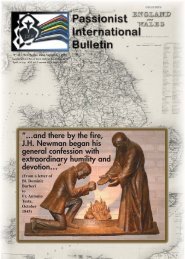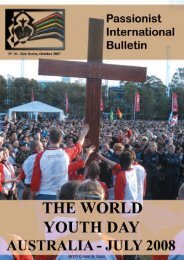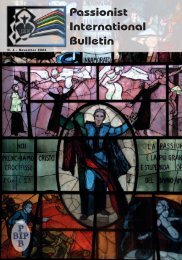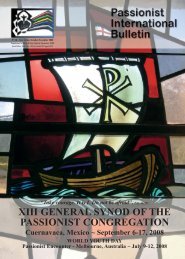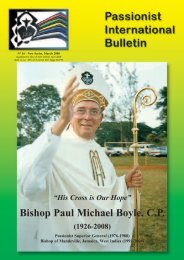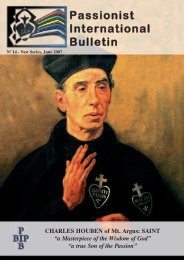The Curia Informs - Passio Christi
The Curia Informs - Passio Christi
The Curia Informs - Passio Christi
You also want an ePaper? Increase the reach of your titles
YUMPU automatically turns print PDFs into web optimized ePapers that Google loves.
<strong>The</strong> <strong>Curia</strong> <strong>Informs</strong><br />
St. Paul of the Cross writing the first draft<br />
of the Rule at Castellazzo<br />
come to us, in continuity with the original source. <strong>The</strong><br />
Constitutions are our patrimony: “<strong>The</strong>n every scribe who<br />
has been instructed in the kingdom of heaven is like the<br />
head of a household who brings from his storeroom both<br />
the new and the old.” (Mt.13:52)<br />
But the heart of this patrimony and the pearl of great price<br />
for which “everything is sold” by us and to which we dedicate<br />
ourselves with great energy and love is the “Memoria<br />
<strong>Passio</strong>nis”. This is the constitutive element of the<br />
Congregation and reason for our existence in the Church.<br />
It is the mandate that God has given to us and to the<br />
<strong>Passio</strong>nist Family by our vocation: Call to mind!<br />
Remember! This is to be understood in the biblical sense<br />
of the command to Israel which from the very beginnings<br />
of its history lived out the experience of continually recalling<br />
the saving acts of God in the past and in anticipation of<br />
their continual renewal in the present. For us “Memoria”<br />
is making the paschal mystery the center of our life, lovingly<br />
dedicating ourselves to follow Christ Crucified and proclaiming<br />
his <strong>Passio</strong>n and Death not only as an historical<br />
event of the past, but as a present reality in the life of people<br />
who are “‘crucified’ as they are by injustice, by the lack<br />
of deep respect for human life…” (Const. No. 65)<br />
<strong>The</strong> Memoria <strong>Passio</strong>nis inspires and enlightens all of the<br />
Constitutions especially the four most important chapters:<br />
Fundamentals, the Apostolate, Formation and the<br />
Constitution of the Congregation. <strong>The</strong> other teachings and<br />
norms revolve around these chapters. And the same traditional<br />
<strong>Passio</strong>nist values of solitude, silence, poverty,<br />
detachment and penance—obviously in addition to prayer<br />
and meditation—are the environment, the greenhouse in<br />
which to cultivate and bring into blossom the flower of the<br />
<strong>Passio</strong>n. So too the specific vow of the formula for profession<br />
— “to recall to mind with greater love the <strong>Passio</strong>n of<br />
our Lord and to promote its memory by word and deed…”<br />
(Const. No.96) — precedes and elucidates the other three<br />
vows of religious life: “In light of this, we seek to incorporate<br />
this vow into our daily lives by living the evangelical<br />
councils.” (Const. No.6)<br />
This 25 th anniversary is an opportunity that the Spirit and<br />
history is giving us to re-read the Constitutions with new<br />
eyes and a new heart.<br />
In his Circular Letter to the Congregation of 15 April 1985,<br />
on the occasion of the publication of the Constitutions,<br />
Bishop Paul Boyle, then Superior General wrote: “On the<br />
feast of the Solemn Commemoration of the <strong>Passio</strong>n, March<br />
2, 1984, the Sacred Congregation for Religious and<br />
Secular Institutes formally approved our revised<br />
Constitutions as an authentic expression of our charism<br />
and purpose in the Church. Once the Constitutions were<br />
approved there followed months of tedious work in controlling<br />
technical details such as spelling, capitalization, punctuation,<br />
and references and proofreading galley sheets of<br />
the official Latin text of the inspirational Rule, the<br />
Constitutions and our Regulations. At the same time several<br />
language commissions were hard at work translating<br />
these three documents into the vernacular.”<br />
He invited us to receive it as “a precious text” and, among<br />
“Solitude, silence, poverty, detachment and penance…<br />
are the environment, the greenhouse<br />
in which to cultivate and bring into blossom<br />
the flower of the <strong>Passio</strong>n.”<br />
-------- Bip N.19 March/April 2009 -------- 5


